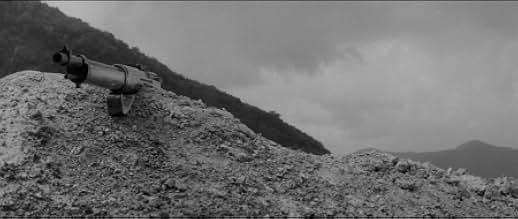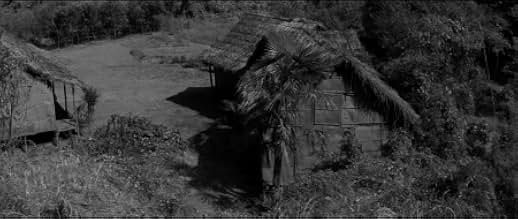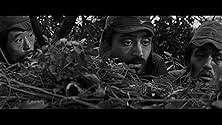AVALIAÇÃO DA IMDb
7,9/10
5,6 mil
SUA AVALIAÇÃO
Nos últimos dias da Segunda Guerra Mundial, remanescentes do exército japonês em Leyte foram abandonados por seu comando e enfrentaram uma morte certa por inanição.Nos últimos dias da Segunda Guerra Mundial, remanescentes do exército japonês em Leyte foram abandonados por seu comando e enfrentaram uma morte certa por inanição.Nos últimos dias da Segunda Guerra Mundial, remanescentes do exército japonês em Leyte foram abandonados por seu comando e enfrentaram uma morte certa por inanição.
- Direção
- Roteiristas
- Artistas
- Prêmios
- 6 vitórias no total
- Direção
- Roteiristas
- Elenco e equipe completos
- Produção, bilheteria e muito mais no IMDbPro
Avaliações em destaque
I recently saw "Nobi" ("Fires On the Plain"), for the second time. Of all Ichikawa's films, and most of his films - (the ones I've seen), even "Tokyo Olympiad", has a strong thread of despair running through them. This is one of the few films (especially as its from the Japanese perspective), that deals, uncompromisingly, with how ordinary soldiers deal with, and are prepared to go, to survive a war where no prisoners were taken. It's a depressing film, but it should be seen by all the people, especially the Generals and Politicians, who think war is an heroic endeavour.
When people think post-war Japanese cinema, they automatically think of Akira Kurosawa. His exported samurai epics have done a good job creating a sense of history, nobility and grace among the art cinema crowd. Yet arguably more important to Japan's unique cinematic history during that era, are the humanistic war stories brought to life by the likes of Masaki Kobayashi, Nagisa Oshima and Kon Ichikawa. Comprising a portion of the Japanese New Wave, these war dramas challenged their viewers head-on, illustrating the ugliness of war in all it's absurdity and horror. These movies were noble in their own way by angrily confronting the attitudes tolerated by Japan during it's peak nationalist period. Fires on the Plain is just as incendiary as it's title would suggest and serves as a prime example of such a film. It may also just be the most engaging and accessible war tale Japan has ever produced.
Set during the closing days of Japan's dominance in the Philippines, our sick, fatigued and jaded hero, Private Tamura attempts to survive the on-coming slaughter. Tamura is forced out of his unit due to tuberculosis; if he's not well enough to dig trenches than he's useless according to his superiors. He treks to the hospital just past the hills only to be rebuffed by the hospital who tells him if he can walk, he's not sick. Before he can return and presumably commit suicide via grenade, Tamura's unit is wiped out in a fierce battle with allied forces. He then wonders aimlessly through the countryside staving starvation, fatigue, death and worse still, fellow brothers in arms.
If Kurosawa is considered the Spielberg of Japan than director Kon Ichikawa is it's Martin Scorsese. Known less for an all-permeating thesis that seeps into his oeuvre, Ichikawa gives his work an idiosyncratic style and a visceral veneer. Throughout his career Ichikawa was known for taking on all popular genres, all of which balanced his knack for realism and expressionism. His worlds always have a beautiful wholeness and lets the pathos from each situation dig into the audiences cranium through all sides. Sometimes he accomplishes this with shock, other times with a mischievous sense of humor. One such iconic moment happens in Fires on the Plain when a platoon of soldiers march upon a pair of jungle boots. One soldier swiftly puts them on and discards his own, the next soldier takes the previous soldier's boots, and so on and so forth until Tamura looks down on the tattered remains of the last guy's boots, takes his off and keeps walking barefooted.
There are many more scenes of contradicting sentiments occupying the same earnest frame. We as the audience must decide whether we should laugh or cry or both yet we never feel the need to look away. There's a dark sense of realism that makes Fires on the Plain stand out from other contemporary works such as The Human Condition Trilogy (1959-1961). The realism, tinged with an expressionistic flare keeps us engrossed; pensively hoping Tamura and his fellow soldiers don't do the unthinkable.
As things become more desperate and deprived on the island of Leyte, the true intentions of the film start to soar with devastating economy. The film was adapted from Shohei Ooka's novel of the same name. Much ado was made at the time about Ichikawa's radical ending change which is surprisingly antithetical to the traditional Hollywood ending we're all so drearily used to. With Ichikawa's ending however there is no absolution, no completion, no sigh of relief. Much like All Quiet on the Western Front (1930) the film's resolution comes with a simple message about the inhumanity of war.
Fires on the Plain is a frightfully good film that tells it's story through imagery both stark, maddening and sublime. Powerful in every sober sense, Ichikawa should be on everyone's short list of most important Japanese filmmakers. He's got a style full of contradiction yet permeating with an excess of feeling. I promise that once you've seen this provocative, bleak, heart-wrenching picture, you won't soon forget it.
Set during the closing days of Japan's dominance in the Philippines, our sick, fatigued and jaded hero, Private Tamura attempts to survive the on-coming slaughter. Tamura is forced out of his unit due to tuberculosis; if he's not well enough to dig trenches than he's useless according to his superiors. He treks to the hospital just past the hills only to be rebuffed by the hospital who tells him if he can walk, he's not sick. Before he can return and presumably commit suicide via grenade, Tamura's unit is wiped out in a fierce battle with allied forces. He then wonders aimlessly through the countryside staving starvation, fatigue, death and worse still, fellow brothers in arms.
If Kurosawa is considered the Spielberg of Japan than director Kon Ichikawa is it's Martin Scorsese. Known less for an all-permeating thesis that seeps into his oeuvre, Ichikawa gives his work an idiosyncratic style and a visceral veneer. Throughout his career Ichikawa was known for taking on all popular genres, all of which balanced his knack for realism and expressionism. His worlds always have a beautiful wholeness and lets the pathos from each situation dig into the audiences cranium through all sides. Sometimes he accomplishes this with shock, other times with a mischievous sense of humor. One such iconic moment happens in Fires on the Plain when a platoon of soldiers march upon a pair of jungle boots. One soldier swiftly puts them on and discards his own, the next soldier takes the previous soldier's boots, and so on and so forth until Tamura looks down on the tattered remains of the last guy's boots, takes his off and keeps walking barefooted.
There are many more scenes of contradicting sentiments occupying the same earnest frame. We as the audience must decide whether we should laugh or cry or both yet we never feel the need to look away. There's a dark sense of realism that makes Fires on the Plain stand out from other contemporary works such as The Human Condition Trilogy (1959-1961). The realism, tinged with an expressionistic flare keeps us engrossed; pensively hoping Tamura and his fellow soldiers don't do the unthinkable.
As things become more desperate and deprived on the island of Leyte, the true intentions of the film start to soar with devastating economy. The film was adapted from Shohei Ooka's novel of the same name. Much ado was made at the time about Ichikawa's radical ending change which is surprisingly antithetical to the traditional Hollywood ending we're all so drearily used to. With Ichikawa's ending however there is no absolution, no completion, no sigh of relief. Much like All Quiet on the Western Front (1930) the film's resolution comes with a simple message about the inhumanity of war.
Fires on the Plain is a frightfully good film that tells it's story through imagery both stark, maddening and sublime. Powerful in every sober sense, Ichikawa should be on everyone's short list of most important Japanese filmmakers. He's got a style full of contradiction yet permeating with an excess of feeling. I promise that once you've seen this provocative, bleak, heart-wrenching picture, you won't soon forget it.
1945. The US recapture of the Philippines is nearing its conclusion, resulting in a Japanese unit being cut off and lacking supplies. In order to reduce the supply problem Private Tamura is ordered to check into the hospital and, if unsuccessful, kill himself. His trip to the hospital ends up being a harrowing journey.
A Japanese war drama that shows the horrors of war in brutal, unvarnished fashion. As much a survival drama as a war drama - we hardly see the enemy at all during the film - Tamura's experiences are harrowing and realistic.
Not perfect though. The film is quite linear and plodding, which is to be expected for the nature of the plot, but it is too slow at times, feeling laboured. While meant to show the inanity and insanity of war, some aspects of the plot aren't entirely watertight.
Still, a great exposition on the wastefulness and depravity of war.
A Japanese war drama that shows the horrors of war in brutal, unvarnished fashion. As much a survival drama as a war drama - we hardly see the enemy at all during the film - Tamura's experiences are harrowing and realistic.
Not perfect though. The film is quite linear and plodding, which is to be expected for the nature of the plot, but it is too slow at times, feeling laboured. While meant to show the inanity and insanity of war, some aspects of the plot aren't entirely watertight.
Still, a great exposition on the wastefulness and depravity of war.
Every American who thinks he or she understands World War Two should see this movie. Few Hollywood films about the war have defied the stereotype of Japanese soldiers as emotionless brutes obeying orders without thinking. We like to think that every Japanese man was ready and able to fight to the death, right up to the day we bombed Nagasaki. "Fires on the Plain" shows a different reality: troops pathetically undersupplied, demoralized and starved to the point of cannibalism. They euphemistically refer to human flesh as "monkey meat." The movie and novel on which it was based also put to death the myth that Japanese soldiers all preferred death to surrender: They had good reason to believe that their enemies were in no mood to take prisoners. To me it raises a question most Americans would rather avoid: If the Japanese military was so beaten down at this point in the war, why was it necessary to nuke Hiroshima?
In Ichikawa Kon's film _The Harp of Burma_ the company of soldiers led by Captain Inoue, although a bit travel worn and homesick, looked at least to be in decent health and well fed in the foreign environs of Burma. However, in his film _Fires on the Plain_ the Japanese soldiers stationed on the Island of Leyte in the Phillipines are malnourished, desperate men who are willing to do anything to survive
The first scene in the film depicts Pvt. Tamura being slapped viciously by his superior. The superior is angry because Tamura returned to their regiment. a sufferer of tuberculosis, Tamura is unable to support himself and relies on the other soldiers, who can barely forage enough food for themselves, to gather food for him. Not wanting a dependent in their midst, Tamura superior sends him back to the hospital along with a few potatoes. Tamura does, however, have one more key item in his possession: a hand grenade.
If he tires of living or is unable to, Tamura is to kill himself with the grenade. The grenade appears several times in the film. One can almost see the gears turning in his head, an inner struggle whether he wants to live or die. However, each times he decides to keep trudging along.
Tamura does in fact arrive back at the hospital, but of course he is refused. The doctors will only let men who are very near death to stay in the hospital. Tamura, unwanted in his own camp, decides to stat with a group of stragglers who have also been cast out of their respective companies. Tamura is able to make friends with these individuals at least until the Americans begin bombing the area. The doctors leave the patients, first taking all the food, to be blown up in the bombing, and Tamura and friend are separated to the four winds.
Tamura continues his travels and eventually arrives in a small village where he kills a Fillpino girl who would not stop screaming. He also tries to kill her boyfriend, but he runs away successfully.
Tamura begins to care for the wounded girl, but pushes her out of the way when he discovers a hidden cache of salt. He soon continues his journey to no real destination.
_Fires on the Plain_ is a brutal film which depicts the remnants of the once powerful Japanese army struggling to survive, but without any hope of ever being truly rescued. These soldiers just want to live for a few hours longer, their primal instincts to survive much stronger than dieing in service of the Emperor. A will to survive that will even make some of them eat "Monkey Meat."
However, even in this bleak film there are some signs of humanity. Tamura although tubercular and emancipated willingly shares his few rations and his precious salt even when he has little. There are moments of semi friendship between Tamura and the stragglers, and also between Tamura and another soldier named Nagamatsu, however, the outlook is bleak for our pleasant spoken Tamura.
Based on a novel written by Ooka Shohei.
The first scene in the film depicts Pvt. Tamura being slapped viciously by his superior. The superior is angry because Tamura returned to their regiment. a sufferer of tuberculosis, Tamura is unable to support himself and relies on the other soldiers, who can barely forage enough food for themselves, to gather food for him. Not wanting a dependent in their midst, Tamura superior sends him back to the hospital along with a few potatoes. Tamura does, however, have one more key item in his possession: a hand grenade.
If he tires of living or is unable to, Tamura is to kill himself with the grenade. The grenade appears several times in the film. One can almost see the gears turning in his head, an inner struggle whether he wants to live or die. However, each times he decides to keep trudging along.
Tamura does in fact arrive back at the hospital, but of course he is refused. The doctors will only let men who are very near death to stay in the hospital. Tamura, unwanted in his own camp, decides to stat with a group of stragglers who have also been cast out of their respective companies. Tamura is able to make friends with these individuals at least until the Americans begin bombing the area. The doctors leave the patients, first taking all the food, to be blown up in the bombing, and Tamura and friend are separated to the four winds.
Tamura continues his travels and eventually arrives in a small village where he kills a Fillpino girl who would not stop screaming. He also tries to kill her boyfriend, but he runs away successfully.
Tamura begins to care for the wounded girl, but pushes her out of the way when he discovers a hidden cache of salt. He soon continues his journey to no real destination.
_Fires on the Plain_ is a brutal film which depicts the remnants of the once powerful Japanese army struggling to survive, but without any hope of ever being truly rescued. These soldiers just want to live for a few hours longer, their primal instincts to survive much stronger than dieing in service of the Emperor. A will to survive that will even make some of them eat "Monkey Meat."
However, even in this bleak film there are some signs of humanity. Tamura although tubercular and emancipated willingly shares his few rations and his precious salt even when he has little. There are moments of semi friendship between Tamura and the stragglers, and also between Tamura and another soldier named Nagamatsu, however, the outlook is bleak for our pleasant spoken Tamura.
Based on a novel written by Ooka Shohei.
Você sabia?
- CuriosidadesIn order to achieve maximum authenticity, actors were fed very little, and were not permitted to tend to matters of simple hygiene such as brushing their teeth and cutting their nails. As a precaution against serious deterioration of the actors' health, a number of nurses were always on call on the set. Eiji Funakoshi was never specifically told not to eat. He willingly abstained from eating to help get himself into character. The rest of the cast and crew were unaware of this until he eventually collapsed on the set. Production was shut down for two weeks.
- ConexõesFeatured in L'Oeil du cyclone: Cannibalisme, réalité ou fantasme (1995)
Principais escolhas
Faça login para avaliar e ver a lista de recomendações personalizadas
- How long is Fires on the Plain?Fornecido pela Alexa
Detalhes
- Tempo de duração
- 1 h 48 min(108 min)
- Cor
- Proporção
- 2.35 : 1
Contribua para esta página
Sugerir uma alteração ou adicionar conteúdo ausente


























